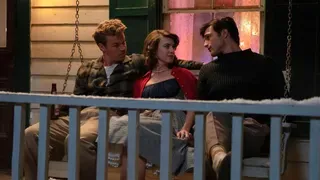February 17, 2019
Odyssey Opera: Paride ed Elena
Ed Tapper READ TIME: 4 MIN.
Reacting to the florid extravagance of Baroque operatic style, the mid-18th century Reform Opera movement simplified the form, employing sober, compact melody, basic harmonic patterns, and plots derived from Classical mythology. The absence of dazzling vocal display and exciting high notes that characterizes Reform style makes for a whole different sensibility for the standard opera goer. There are long stretches of accompanied dialogue, and, in place of bravura arias, simple, heartfelt songs. Once the adjustment is made, these works can prove quite moving and powerful.
Christoph Willibald Gluck is the composer most closely associated with the movement, and his "Orfeo ed Euridice" is the archetypal example of Reform style. No other opera by the prolific Gluck has achieved such lasting fame, and, although others are occasionally recorded, none are performed with the frequency of "Orfeo..."
Boston's Odyssey Opera has dedicated the 2019 segment of its current season to works based on the legend of Helen of Troy. The first on the roster is the Gluck Reform rarity, "Paride ed Elena." Though composed in 1770, the work has apparently never been performed in Boston. Odyssey's engaging production was worth the long wait.
The Boston premiere of "Paride ed Elena" was given at the Huntington Theatre, in an impeccably sung and staged production, in every way respectful to this Pre-Classical period and the composer's intentions. It's always a treat to attend an Odyssey show, as the company never panders to the current trend for outrageous and oversexed, updated productions. In the case of the "Paride...," every detail was elegant and beautifully realized. Though not elaborate, the costumes of Brooke Stanton were striking, and ideal for allowing easy movement of singers and dancers, while conveying a true flavor of ancient Greece.
The proscenium was bordered with fragments of a huge frame, setting off the opera as an oversized, 18th century canvas. All the sets of Lindsay Fuori served the drama and choreography well. With the exception of an unfortunate, full view of the building's brick and iron rear wall, which was exposed for the last scene, the sets were very much in keeping with the feel of Gluck's opera.
Adding to the visual and musical splendor of the production, all of the ballet sequences were included, performed by an excellent troupe of dancers in fine, tasteful choreography by Melinda Sullivan. The dancers were also interpolated into the drama itself, emphasizing dramatic situations, while lending vigor to some of the solo scenes and ensembles. As is the case with all operas, it is the singing which is of primary importance; and, in the case of this "Paride ed Elena," it scarcely could have been bettered.
In keeping with the tradition of the original production, the three main cast members were sopranos. Originally, the key role of Paride, the Trojan prince Paris, was sung by a high castrato, and the roles of Helen and Cupid, by women. Odyssey's Paride was Canadian mezzo-soprano Meghan Lindsay, who sang with conviction and nuance throughout. Her opening aria, "O del mio dolce ardor," the one big hit from the opera, was nicely realized; but as the opera progressed, she hit her stride, and her subsequent arias were sung with a rich tone and true passion.
Another Canadian artist, Mireille Asselin possessed the physical beauty and just the right shimmer to her soprano to create an ideal Helen. Singing regularly at the Metropolitan in NYC, she is a fine actress and an attractive stage presence. Equally well cast was Erica Schuller as Cupid. A gifted singer and comedienne, she was completely comfortable in the Early Music idiom, and an absolute delight in the role. An added treat was soprano Dana Lynne Varga who appeared in the penultimate scene of the opera as Pallade Athene, the deus ex machina of the story. With a soprano of impressive scale, she intoned her impassioned prophecy with a such intensity, that her one scene nearly stole the entire show. The chorus and orchestra, under the solid direction of Gil Rose, were excellent.
There is one more performance of the Gluck opera on Sunday afternoon, February 17th, and it would be well worth the effort. A ticket would provide not only entry into the theater, but direct passage into the 18th century as well. In the Spring, Odyssey Opera will present two more portraits of the devastating Helen, in two very contrasting musical styles. From the German, Post-Romantic repertoire, Richard Strauss' "Die Agyptische Helena" will be given in a concert version at Jordan Hall in April. In June, the season will come to a delightful close with the music of French master Jacques Offenbach, in a fully staged production of his comic parody of the myth, "La Belle Helene."
"Paride ed Elena" will be performed Sunday, February 17 at 2pm at the Huntington Avenue Theatre, 264 Huntington Avenue, Boston, MA. For more information, visit the Odyssey Opera website.







